Disclosure: Meeple Mountain received a free copy of this product in exchange for an honest, unbiased review. This review is not intended to be an endorsement.
Clue was always a big hit in my house as a kid. Even now, as an adult, my love for Clue lives on thanks to the addition of Clue Junior to my collection. My daughter and I loved playing that one as a way to begin a day of gaming, even if it was more of an exercise than a deduction game.
Recently, there has been a slight but noticeable boost to deduction game content of all shakes. Blood on the Clocktower has been a hit for those looking to update their party-size deduction gaming experiences; Turing Machine was big news last year, in the bite-sized 15-to-30-minute category. I have a soft spot for The Search for Planet X, which fits nicely into the 45-to-90-minute deduction game window for those looking for a bit more meat on the app-driven bone.
Designer Sid Sackson (Acquire, Samarkand Bazaar) made dozens of games before passing away a few years ago, including a deduction game that I can best describe as “Advanced Clue.” Sleuth (1971, originally published as a part of the 3M “Gamette” series, currently published by Eagle-Gryphon Games) is a pretty solid take on the idea that players are trying to identify the murder weapon, the McGuffin, the missing something-or-other, and the whodunit before the other investigators.
Sleuth is a 50-year-old game that somehow holds up well even by today’s standards. Why?
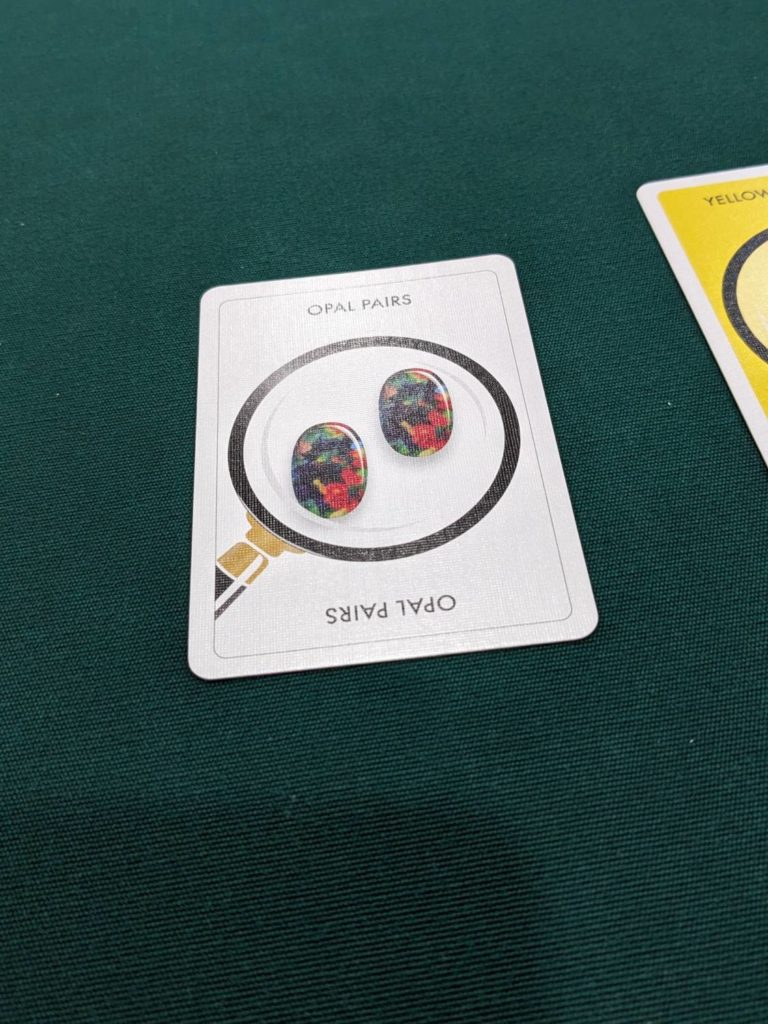
The Missing Gem
In Sleuth, 3-7 players have to figure out which of the 36 gem cards is the missing link. The gems are broken into four colors—red, yellow, blue and green—and three types, diamonds, opals and pearls. Within these types, gems are broken down into solitaire, pairs and clusters.
During setup, these gem cards are shuffled, one is removed from play face-down, then the other 35 are distributed across the player pool, with any extras that are not evenly handed out made available for all players to see.
That means that each player starts with somewhere between 5-13 pieces of information that are known, therefore removing them from consideration. But you don’t know what everyone else has in their hand. Each player has four face-up cards from a search deck in front of them. On each turn a player uses one of their search cards to interrogate another player about a card or cards in their hand.
Some of the search cards are “one-element” cards—they have a color, gem type, or number (solitaire, pairs, or clusters). For example, a player will push their “Yellow” search card to the middle of the table and say “Andy, tell me how many yellow cards you have in your hand.” The subject has to truthfully announce the number to the table, but not show any cards. Single element cards are discussed but never shown.
Two-element cards are different. For example, a card that says “Yellow Pairs” could be played; “Bob, how many yellow pairs do you have?” Two-element cards have to be shared with the interrogator, face down, while also being announced to the table. In this way, two-element cards give the interrogator definitive information, but also help the other players narrow down that target’s potential hand of cards.
Finally, some search cards are “Free Choice” cards that provide flexibility for the interrogator; these can be used as either one-element or two-element cards, based on the current needs of the player.
Turns go around and around until someone wants to make a final guess, even if it is not that player’s turn. If they are right, they win; a wrong guess eliminates that player from winning contention but they are still allowed to participate by providing answers to clues about their cards.
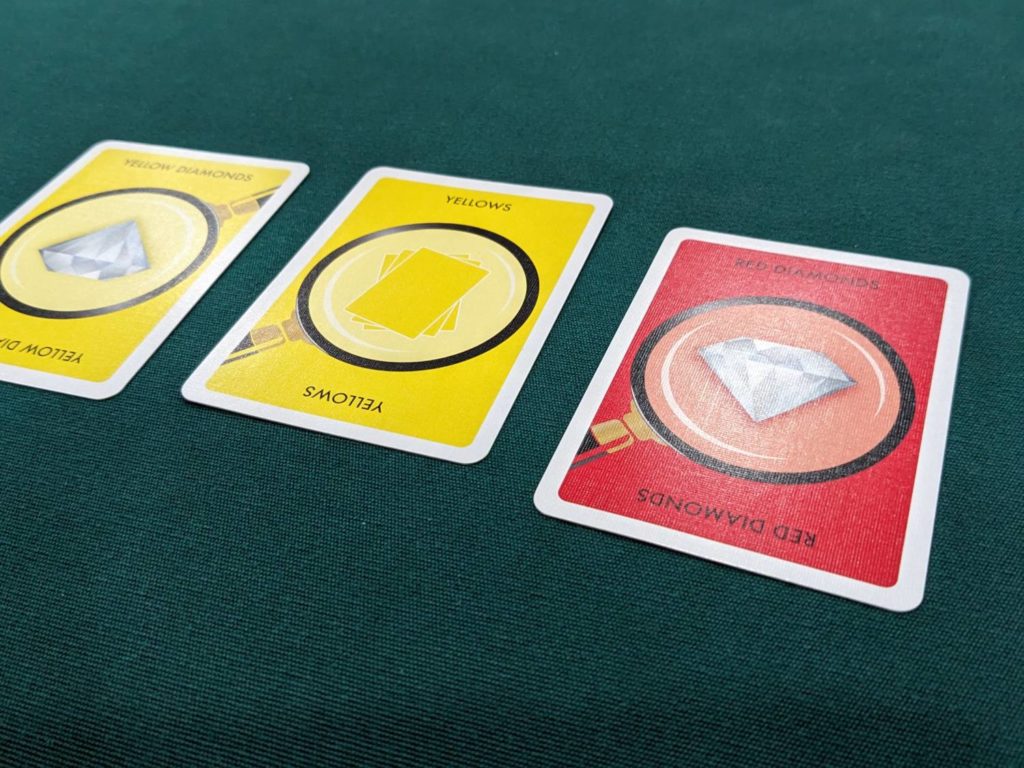
Advanced Clue
I enjoy Sleuth as a harder version of Clue.
Certainly, it’s funnier to say a line like “It was Mr. Green…in the Conservatory…with the lead pipe!!” It’s also more amusing to play dress-up on the night when Clue hits the table, and I can break out my most yellow outfit to take on the role of Colonel Mustard.
But Sleuth might have the edge when I want a step up in difficulty from the deduction games of my youth.
Sleuth is definitely a deduction game for adults. Also, the small footprint makes for an easy travel game. Sleuth accommodates up to seven players, and my sense is that Sleuth plays best as a five- or seven-player game based purely on the number of cards that are left over after removing the hidden gem to begin the game (this leads to players having an equal number of cards, all of which were secret, as opposed to a face-up market of leftover cards that couldn’t be dealt to other players).
The rub of how to deduce what each player has in their hand with limitations on what questions they can ask…this is the strength of Sleuth. Deciphering what each player has can be incredibly difficult, regardless of the player count. I found myself adoring a moment when I had choices between two-element search cards in my possession so that I could get some hard facts down on paper. I also laughed (in my head) when I looked at my four search cards late in a game and realized that two or three of them wouldn’t yield any new information, for me at least.
Sleuth is a good challenge, and I could see deduction game lovers and/or veterans really soaking this one up. Conversely, some players will bounce off of Sleuth because it requires very diligent note-taking.
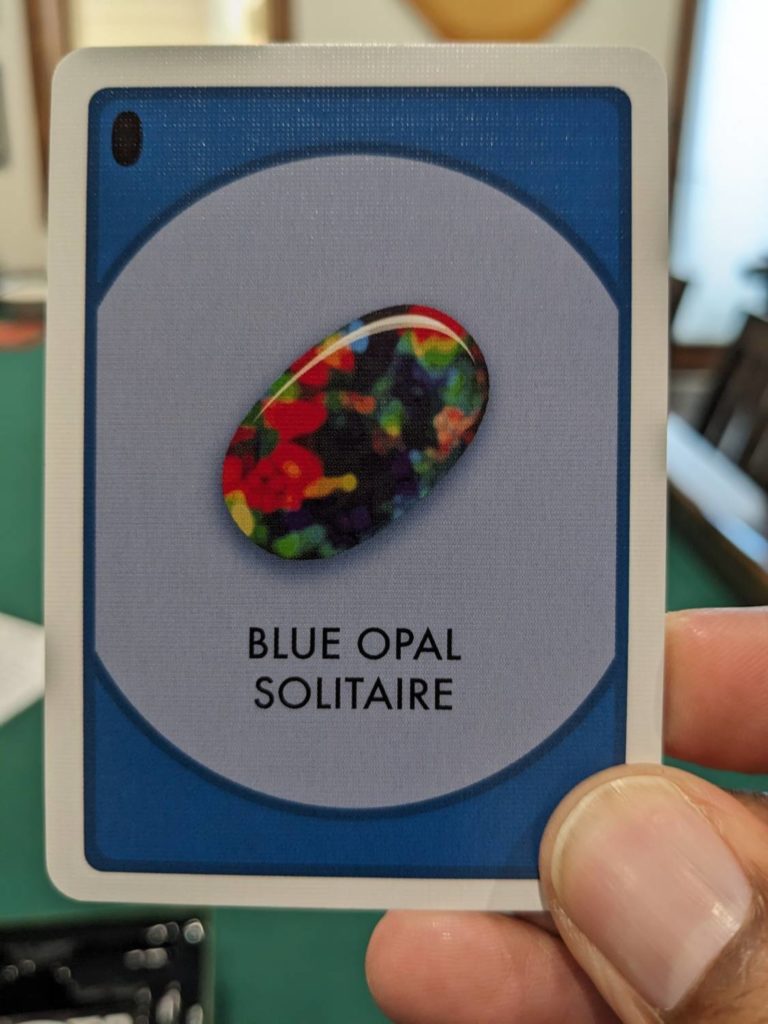
Also, Sleuth is an old-school game in another way—it requires your full attention on every single turn. You’ve got to take notes on what players have, based on what they’ve shown you, and note who gave you which cards. You also have to closely track what players might have; narrowing a player’s hand down to what is truly possible is maybe the hardest part of Sleuth, and what is ultimately most rewarding in terms of the experience.
The downside is the difficulty: in a six- or seven-player game, I could see a game ending where a couple players have no idea how someone came up with the final answer. It’s not a great game for players new to deduction experiences, based on the requirements of the note-taking.
The note sheet is great for writing big Xs next to what gems have been eliminated from consideration, but frankly terrible for someone who has larger handwriting and wants to use each tickbox for both Xs and notes.
However, I get why the sheets are small if the game box needs to be a certain size. Just know that over a longer game, you will definitely have a scribble sheet that looks like it was attacked by a crayon-armed three-year-old by the end of play. Each time I’ve played Sleuth, the note sheet is an absolute mess.
For deduction game fans, Sleuth is a must-play. It’s a solid 30-to-45-minute sit that will reward an aspiring investigator. Rest in peace, Sid Sackson…you were great at your craft!


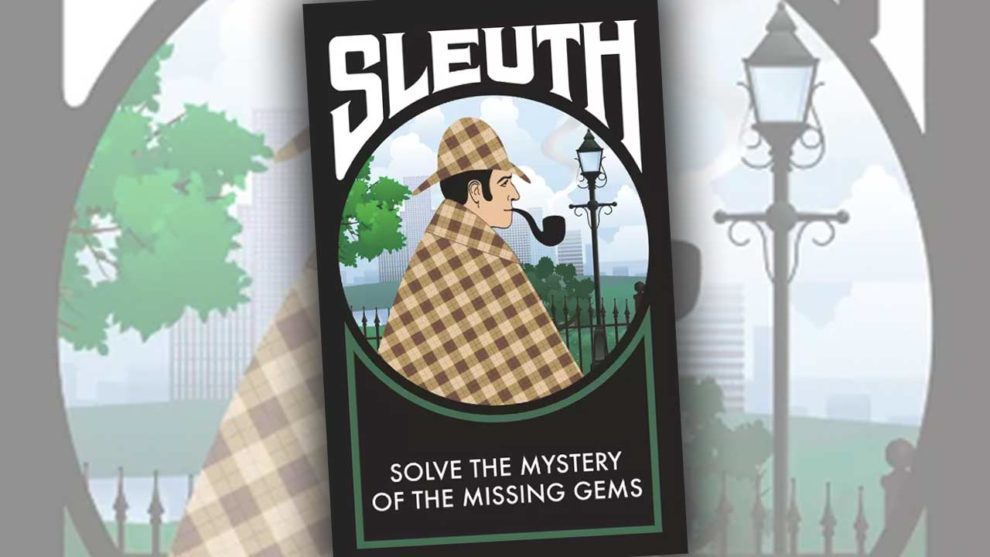

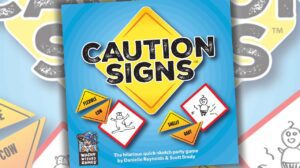

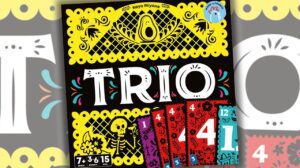





Add Comment